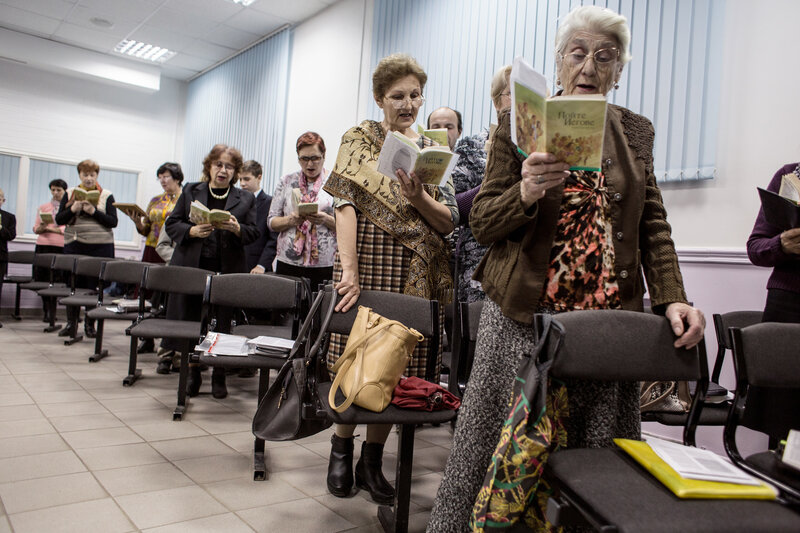
Russia's top prosecutor is threatening to ban the Jehovah's Witnesses for alleged "extremism."
The religious denomination has faced growing pressure in Russia over the past several years, with church members arrested and confiscations of church property.
The Jehovah's Witnesses aren't alone. Other denominations, such as the Mormons, are also under pressure.
Jehovah's Witness leaders say a nationwide ban would affect some 175,000 church members but wouldn't stop their activities.
One important activity for members is Bible study on weekday evenings. A couple of hundred people gathered at a Kingdom Hall in St. Petersburg on a recent evening to sing and discuss the meaning of Bible stories. They also talked about how to tell other people about their vision of Christianity and their version of the Bible.
The Jehovah's Witnesses are well-known for preaching door to door and offering tracts such as "The Watchtower," and they do that in Russia too. They have been active in Russia since at least 1891, when a man was sent to Siberia for preaching the doctrine, says spokesman Robert Zick at the church's headquarters in Brooklyn, N.Y. But the Jehovah's Witnesses were not officially registered in Russia until a century later.
An Official Warning
One thing that's very much on church members' minds now is the prospect that their preaching could be banned.
In March, the group received a warning from the Russian general prosecutor's office, saying it had two months to stop all activities that are deemed to be "extremist."
"The main problem that we face now is misuse of the anti-extremism law," says Yaroslav Sivulsky, vice chairman of Russia's Presiding Committee of Jehovah's Witnesses. "In the whole world, Jehovah's Witnesses are known as peaceful, obedient, respectful citizens. We respect government, and we are politically totally neutral."
Sivulsky says the accusation of extremism is based on a false understanding of the Jehovah's Witnesses' assertion that theirs is the only true religion. Prosecutors have alleged that means they are promoting "religious discord."
"And of course, it's totally wrong," Sivulsky says, "because every religion feels that they have the only true religion. This is the nature of any religion, otherwise, why are you following a false religion?"
Some opponents of the Jehovah's Witnesses say their claims are more than just polite disagreement, though.
"In their literature, there are some very harsh statements and very insulting statements about other faiths," says Alexander Dvorkin, a former Russian Orthodox priest who now teaches the history of religion and cult studies at St. Tikhon University in Moscow. "Of course, every religion has the right to criticize other faiths, but that should be done in a non-insulting manner, especially if you are talking about the faith of the majority."
No comments:
Post a Comment
Get more stories like this on our twitter @Abdul_Ent and facebook page @abdulkukublogspot